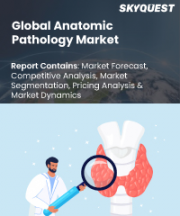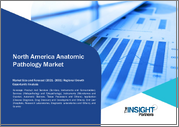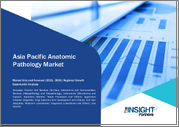
|
시장보고서
상품코드
1638796
해부 병리학 시장 기회, 성장 촉진요인, 산업 동향 분석, 예측(2024-2032년)Anatomic Pathology Market Opportunity, Growth Drivers, Industry Trend Analysis, and Forecast 2024 - 2032 |
||||||
세계의 해부 병리학 시장은 2023년에 약 367억 달러로 평가되며, 2024-2032년에 CAGR 7.8%로 성장할 것으로 예측됩니다.
병리학의 전문 분야인 해부 병리학은 수술 표본, 조직 및 장기를 검사하여 질병을 진단하는 데 초점을 맞추었습니다. 해부 병리학자는 조직병리학, 세포병리학, 부검병리학 등의 기술을 사용하여 샘플을 세포 수준에서 분석하여 질병 과정으로 인한 구조적, 기능적 변화를 밝힙니다.
질병, 특히 암의 유병률 증가는 해부 병리학 서비스에 대한 큰 수요를 주도하고 있습니다. 전 세계에서 질병 부담이 증가함에 따라 정밀진단 툴에 대한 필요성이 급증하고 있습니다. 조직병리학 및 세포병리학과 같은 기술은 정확한 질병을 감지하고 관리하는 데 필수적이며, 시장 성장에 박차를 가하고 있습니다. 또한 바이오마커의 사용 확대, 병리 검사 장비의 발전, 임상시험 증가 등은 진단의 정확성과 신뢰성을 높이고 있습니다. 디지털 병리학과 같은 기술은 진단의 효율성과 정확성을 더욱 향상시켜 이 분야의 성장에 기여하고 있습니다.
제품 및 서비스 기반 시장 세분화에는 장비, 소모품, 서비스 등이 포함되며, 소모품 부문은 2023년 192억 달러의 매출을 기록하며 시장을 주도할 것으로 예상되며, 향후에도 꾸준한 성장이 예상됩니다. 정밀 슬라이드 및 시약과 같은 고품질 소모품은 진단 정확도 향상과 실험실 간 표준화에 필수적입니다. 즉시 사용 가능한 소모품은 워크플로우의 효율성을 높이고, 준비 시간을 최소화하며, 검사자가 시료 분석에 집중할 수 있도록 함으로써 실험실 생산성을 향상시킵니다.
| 시장 범위 | |
|---|---|
| 시작연도 | 2023년 |
| 예측연도 | 2024-2032년 |
| 시작 금액 | 367억 달러 |
| 예상 금액 | 719억 달러 |
| CAGR | 7.8% |
용도별로는 질병 진단과 조사로 구분되며, 2023년에는 질병 진단, 특히 암 진단이 가장 큰 시장 점유율을 차지할 것으로 예상됩니다. 해부 병리학은 조직과 세포의 상세한 분석을 통해 질병의 형태에 대한 귀중한 인사이트을 제공하고 정확한 진단에 도움을 줍니다. 유전체학 및 단백질체학와 같은 분자 검사 기술과의 통합은 진단 결과를 유전자 및 바이오마커 데이터와 일치시킴으로써 맞춤형 의료를 더욱 강화할 수 있습니다.
병원 최종 용도 부문은 2023년 55.4%의 점유율을 차지하며 큰 폭의 성장이 예상됩니다. 병원은 광범위한 진단 툴을 사용할 수 있으므로 환자 치료에 대한 종합적인 접근이 가능하다는 이점을 누릴 수 있습니다. 고급 분자 검사와 해부병리 검사를 결합함으로써 병원은 특히 종양학 분야에서 개인화된 치료를 제공할 수 있으며, 치료 성과와 환자 만족도를 향상시킬 수 있습니다.
북미에서는 질병 유병률이 높고 의료 인프라가 잘 구축된 미국이 해부 병리학 시장을 주도하고 있습니다. 디지털 병리학 및 AI 기반 툴와 같은 첨단 진단 기술이 널리 채택되어 진단 정확도를 높이고 환자 치료 전반을 향상시키고 있습니다.
목차
제1장 조사 방법과 조사 범위
제2장 개요
제3장 업계 인사이트
- 에코시스템 분석
- 업계에 대한 영향요인
- 촉진요인
- 세계의 암과 기타 대상 질환의 이환율 상승
- 바이오마커의 채택 확대
- 항암제에 관한 임상시험의 증가
- 병리검사 장비의 기술 진보의 증가
- 업계의 잠재적 리스크 & 과제
- 기기의 고비용
- 재생 해부 병리 시스템의 가용성
- 촉진요인
- 성장 가능성 분석
- 규제 상황
- 기술적 전망
- 코어 기술
- 인접 기술
- 향후 시장 동향
- Porter의 산업 분석
- PESTEL 분석
제4장 경쟁 구도
- 서론
- 기업 점유율 분석
- 기업 매트릭스 분석
- 주요 시장 기업의 경쟁 분석
- 경쟁 포지셔닝 매트릭스
- 전략 대시보드
제5장 시장 추산·예측 : 제품·서비스별, 2021-2032년
- 주요 동향
- 기계
- 마이크로톰
- 셀 프로세서
- 조직 처리 시스템
- 슬라이드 염색 시스템
- 임베딩 시스템
- 커버슬리퍼
- 기타 기계
- 소모품
- 항체
- 1차 항체
- 2차 항체
- 키트·시약
- 염색·용매
- 고정제
- 기타 키트·시약
- 프로브
- 기타 소모품
- 항체
- 서비스
- 병리 조직 검사
- 세포 병리
제6장 시장 추산·예측 : 용도별, 2021-2032년
- 주요 동향
- 질환 진단
- 암
- 유방암
- 소화기암
- 폐암
- 전립선암
- 기타 암
- 기타 질환
- 암
- 조사
제7장 시장 추산·예측 : 최종 용도별, 2021-2032년
- 주요 동향
- 병원
- 진단 센터
- 기타 최종사용자
제8장 시장 추산·예측 : 지역별, 2021-2032년
- 주요 동향
- 북미
- 미국
- 캐나다
- 유럽
- 독일
- 영국
- 프랑스
- 스페인
- 이탈리아
- 네덜란드
- 아시아태평양
- 중국
- 일본
- 인도
- 호주
- 한국
- 라틴아메리카
- 브라질
- 멕시코
- 아르헨티나
- 중동 및 아프리카
- 남아프리카공화국
- 사우디아라비아
- 아랍에미리트
제9장 기업 개요
- Supply-side
- Demand-side(Laboratories)
The Global Anatomic Pathology Market, valued at around USD 36.7 billion in 2023, is projected to grow at a CAGR of 7.8% from 2024 to 2032. Anatomic pathology, a specialized branch of pathology, focuses on diagnosing diseases by examining surgical specimens, tissues, and organs. Utilizing techniques like histopathology, cytopathology, and autopsy pathology, anatomic pathologists analyze samples at a cellular level, uncovering structural and functional changes caused by disease processes.
The growing prevalence of diseases, particularly cancer, drives significant demand for anatomic pathology services. With an increasing disease burden worldwide, the need for precise diagnostic tools has surged. Techniques like histopathology and cytopathology are critical for accurate disease detection and management, fueling market growth. Furthermore, the expanding use of biomarkers, advancements in pathology equipment, and the rise in clinical trials are all enhancing diagnostic precision and reliability. Technologies like digital pathology further support the efficiency and accuracy of diagnoses, contributing to the sector's growth.
Market segments based on products and services include instruments, consumables, and services. The consumables segment, which generated USD 19.2 billion in revenue in 2023, led the market and is anticipated to maintain robust growth. High-quality consumables, such as precision slides and reagents, are essential for improving diagnostic accuracy and standardization across labs. Ready-to-use consumables enhance workflow efficiency, minimizing preparation time and improving lab productivity by enabling technicians to focus on specimen analysis.
| Market Scope | |
|---|---|
| Start Year | 2023 |
| Forecast Year | 2024-2032 |
| Start Value | $36.7 Billion |
| Forecast Value | $71.9 Billion |
| CAGR | 7.8% |
By application, the market is divided into disease diagnostics and research, with disease diagnostics, particularly cancer diagnostics, holding a substantial market share in 2023. Anatomic pathology enables detailed tissue and cell analysis, providing valuable insights into disease morphology, which aids in accurate diagnosis. Integration with molecular testing techniques, like genomics and proteomics, further enhances personalized medicine by aligning diagnostic findings with genetic and biomarker data.
The end-use segment of hospitals held a 55.4% share in 2023 and is poised for substantial growth. Hospitals benefit from access to a broad range of diagnostic tools, allowing for a comprehensive approach to patient care. Advanced molecular testing, combined with anatomic pathology, enables hospitals to offer personalized treatments, especially for oncology, thus enhancing treatment outcomes and patient satisfaction.
In North America, the U.S. leads the anatomic pathology market due to high disease prevalence and a well-established healthcare infrastructure. Advanced diagnostic technologies, including digital pathology and AI-driven tools, are widely adopted, boosting diagnostic accuracy and enhancing overall patient care.
Table of Contents
Chapter 1 Methodology & Scope
- 1.1 Market scope & definitions
- 1.2 Research design
- 1.2.1 Research approach
- 1.2.2 Data collection methods
- 1.3 Base estimates & calculations
- 1.3.1 Base year calculation
- 1.3.2 Key trends for market estimation
- 1.4 Forecast model
- 1.5 Primary research and validation
- 1.5.1 Primary sources
- 1.5.2 Data mining sources
Chapter 2 Executive Summary
- 2.1 Industry 360° synopsis
Chapter 3 Industry Insights
- 3.1 Industry ecosystem analysis
- 3.2 Industry impact forces
- 3.2.1 Growth drivers
- 3.2.1.1 Rising incidence of cancer and other target diseases worldwide
- 3.2.1.2 Growing adoption of biomarkers
- 3.2.1.3 Increasing number of clinical trials pertaining to cancer drugs
- 3.2.1.4 Increasing technological advancements of pathology equipment
- 3.2.2 Industry pitfalls & challenges
- 3.2.2.1 High cost of equipment
- 3.2.2.2 Availability of refurbished anatomic pathology systems
- 3.2.1 Growth drivers
- 3.3 Growth potential analysis
- 3.4 Regulatory landscape
- 3.5 Technological landscape
- 3.5.1 Core technologies
- 3.5.2 Adjacent technologies
- 3.6 Future market trends
- 3.7 Porter's analysis
- 3.8 PESTEL analysis
Chapter 4 Competitive Landscape, 2023
- 4.1 Introduction
- 4.2 Company market share analysis
- 4.3 Company matrix analysis
- 4.4 Competitive analysis of major market players
- 4.5 Competitive positioning matrix
- 4.6 Strategy dashboard
Chapter 5 Market Estimates and Forecast, By Product and Service, 2021 - 2032 ($ Mn)
- 5.1 Key trends
- 5.2 Instruments
- 5.2.1 Microtomes
- 5.2.2 Cell processors
- 5.2.3 Tissue processing systems
- 5.2.4 Slide staining systems
- 5.2.5 Embedding systems
- 5.2.6 Coverslippers
- 5.2.7 Other instruments
- 5.3 Consumables
- 5.3.1 Antibodies
- 5.3.1.1 Primary antibodies
- 5.3.1.2 Secondary antibodies
- 5.3.2 Kits and reagents
- 5.3.2.1 Stains and solvents
- 5.3.2.2 Fixatives
- 5.3.2.3 Other kits and reagents
- 5.3.3 Probes
- 5.3.4 Other consumables
- 5.3.1 Antibodies
- 5.4 Services
- 5.4.1 Histopathology
- 5.4.2 Cytopathology
Chapter 6 Market Estimates and Forecast, By Application, 2021 - 2032 ($ Mn)
- 6.1 Key trends
- 6.2 Diseases diagnostics
- 6.2.1 Cancer
- 6.2.1.1 Breast cancer
- 6.2.1.2 Gastrointestinal cancer
- 6.2.1.3 Lung cancer
- 6.2.1.4 Prostate cancer
- 6.2.1.5 Other cancer types
- 6.2.2 Other diseases
- 6.2.1 Cancer
- 6.3 Research
Chapter 7 Market Estimates and Forecast, By End Use, 2021 - 2032 ($ Mn)
- 7.1 Key trends
- 7.2 Hospitals
- 7.3 Diagnostic centers
- 7.4 Other end users
Chapter 8 Market Estimates and Forecast, By Region, 2021 - 2032 ($ Mn)
- 8.1 Key trends
- 8.2 North America
- 8.2.1 U.S.
- 8.2.2 Canada
- 8.3 Europe
- 8.3.1 Germany
- 8.3.2 UK
- 8.3.3 France
- 8.3.4 Spain
- 8.3.5 Italy
- 8.3.6 Netherlands
- 8.4 Asia Pacific
- 8.4.1 China
- 8.4.2 Japan
- 8.4.3 India
- 8.4.4 Australia
- 8.4.5 South Korea
- 8.5 Latin America
- 8.5.1 Brazil
- 8.5.2 Mexico
- 8.5.3 Argentina
- 8.6 Middle East and Africa
- 8.6.1 South Africa
- 8.6.2 Saudi Arabia
- 8.6.3 UAE
Chapter 9 Company Profiles
- 9.1 Supply-side
- 9.1.1 Agilent Technologies
- 9.1.2 Becton, Dickinson and Company
- 9.1.3 Cardinal Health
- 9.1.4 Danaher Corporation
- 9.1.5 F. Hoffmann-La Roche
- 9.1.6 Merck
- 9.1.7 Thermo Fisher Scientific
- 9.2 Demand-side (Laboratories)
- 9.2.1 Ampath Laboratories
- 9.2.2 Al Borg Medical Laboratories
- 9.2.3 Biolab
- 9.2.4 Eurofins Scientific
- 9.2.5 Laboratoires Reunis
- 9.2.6 Lifebrain Group
- 9.2.7 Lancet Laboratories
- 9.2.8 Medsol Diagnostics
- 9.2.9 Synlab Group
- 9.2.10 Unilabs



















